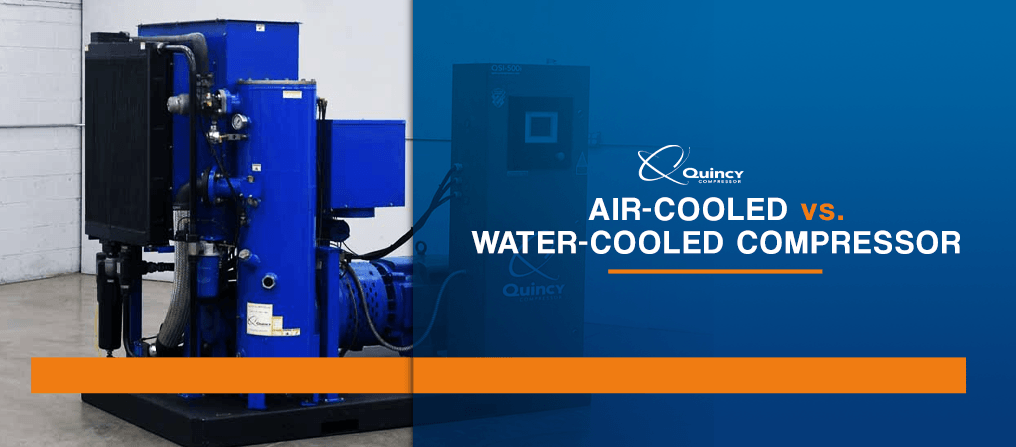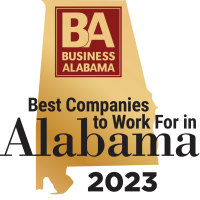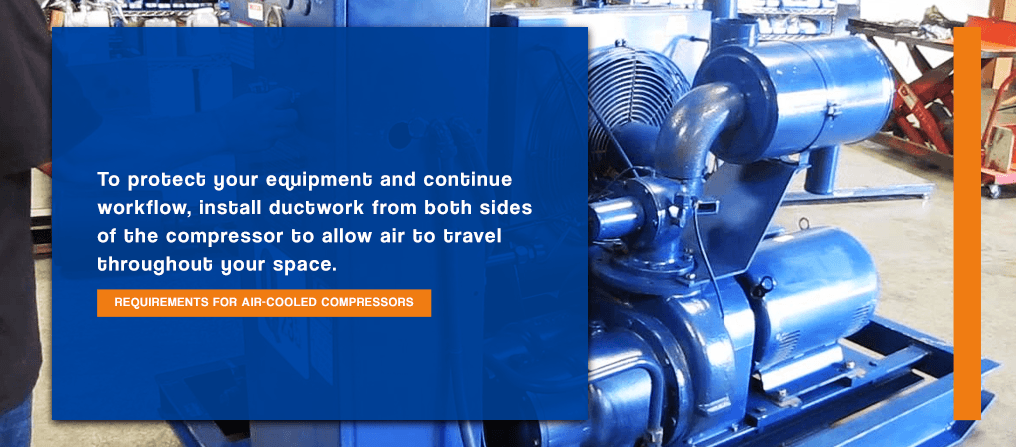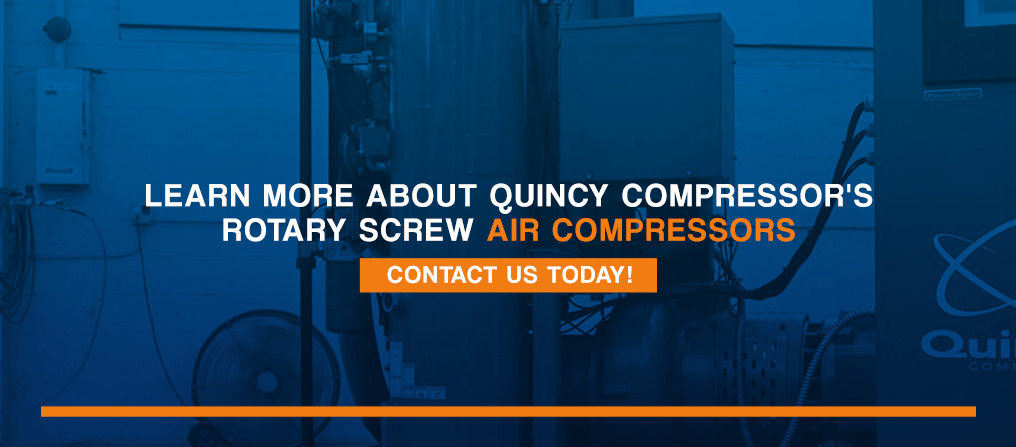
An air compressor is a positive displacement compressor that produces energy to power commercial tools and equipment. Rotary screw air compressors generate heat as they function, which is why compressed air needs to be cooled — either with air or a chilled liquid.
Whether you get a water-cooled or air-cooled compressor for your business depends on your commercial space’s location, tools and size. Explore some of the comparisons between an air-cooled vs. water-cooled compressor to help you make a decision.
How Does an Air-Cooled Compressor Work?
An air-cooled compressor uses air to reduce the temperature of the compressed air and any other material present. When the compressor makes heat, the air-cooled circuit reduces the hot air with a fan and radiator. An air-cooled compressor is the most common air compressor cooling system, making it more accessible than water-cooled systems.
Industries can recover the heat loss for an air-cooled compressor by using the energy to heat buildings or power a preheating battery, thus saving companies money on utility expenses. The circuit directs the heat to an area with a fan, but if the building doesn’t need more heat, the unit releases the hot air into the atmosphere through the thermostat or air damper control.
How Does a Water-Cooled Compressor Work?
Water-cooled compressors use liquid coolant from an external unit to cool the compressed air and any other substances present during the compression process. The cooling circuit reduces the heat with a shell and tube exchanger. Water-cooled units are more common in machines with higher horsepower.
Companies can reuse the water from the compressor in a hot water heating system, usually for showering, washing or cleaning. A water-cooled screw compressor may allow a business to invest in a smaller water boiler because you won’t need as much hot water.
Energy Costs of Air-Cooled vs. Water-Cooled
When considering each air compressor cooling system’s energy cost, you should keep the following factors in mind:
- Energy expenditure: Air-cooled units require more power than water-cooled ones.
- Electricity cost: Water-cooled compressors cost a lot of money regarding electricity, water and water treatment expenses, so you’ll save money with air-cooled equipment.
- Ability to recoup resources: Both types of compressor cooling systems offer reusable resources to recompense energy expenditure costs. If you can reuse a liquid-cooled compressor’s water to preheat boilers, you can save on gas and heating bills. You can also use the heated air from an air-cooled compressor to make a room warmer and power a fluid heat exchanger.
Requirements for Air-Cooled Compressors
An air-cooled screw compressor needs enough cooling air and space to provide adequate airflow. Improper planning may result in problems with regulating your commercial facility’s temperature. If the compressor room is too hot, the business could experience equipment failure and unplanned shutdowns.
To protect your equipment and continue workflow, install ductwork from both sides of the compressor to allow air to travel throughout your space. You can also use the heat from the vents to warm up your commercial space in the winter. If your business doesn’t have enough room for additional equipment, it might be better to set up a water-cooled compressor.
Requirements for Water-Cooled Compressors
A water-cooled screw compressor needs high-quality cooling water to function. If you get water from a lake, ocean, well or river, you’d need a cooling tower and closed-loop system to filter the water and increase your system’s lifespan.
Unless your building already has this equipment, you’ll need to include the cost of purchasing, installing and maintaining this new machinery along with your water-cooled compressor. If you already have a closed-loop cooling system on-site, make sure it can accommodate your water-cooled compressor before you install it.
Which System Should You Choose?
Air compressors can serve various industrial applications, but you need to choose the best type for your specific business. Here are some factors to consider when looking for the right rotary screw air compressor:
- Cost of operation and resources: With the rising cost of water regulation, it’s essential to consider how much you’ll have to pay to use and maintain your equipment. Since water-cooled air systems utilize much more water to reduce the air’s heat, they can be expensive. Air-cooled screw compressors don’t use as much water to power their products, and they also have a lower upfront and installation cost.
- Requirements for air demand: When considering your air demand requirements, account for the product’s horsepower (hp), cubic feet per minute (cfm) rating and pounds per square inch (psi) rating. A unit’s horsepower offers more potential for meeting high air demands. The cfm rating measures how much air the compressor can produce each minute to give you the appropriate psi. Look at the cfm and psi ratings to determine which one can accommodate your tools and energy requirements.
- Type of tools your industry uses: Consider your equipment’s horsepower requirements and figure out the appropriate cfm and psi ratings for your rotary screw air compressor. You could invest in a smaller unit if you use your tools sporadically, but you should get a larger one if you run them continually.
- The compressor room’s layout: Before choosing an air compressor, make sure the room has enough space for it. If space is an issue, you could get a few smaller compressors instead of buying one large unit and put them in multiple areas around the factory. Keep in mind that most rotary screw compressors with less horsepower usually aren’t available in water-cooled models.
- The compressor room’s ventilation: Air-cooled compressors need adequate airflow to function and regulate their temperature. If the room doesn’t have the proper ventilation, the area could get too hot and the equipment could shut down, delaying projects. You also would need to keep your air-cooled compressor away from a hot boiler room or fumes. Water-cooled compressors can better accommodate small spaces and higher temperatures.
When considering these factors, remember that one type of rotary screw air compressor isn’t better than the other. Your choice between air-cooled vs. water-cooled compressors depends on your specific application and location. Discuss your options with a compressed air expert before deciding which one would be appropriate for your industry.
Learn More About Quincy Compressor’s Rotary Screw Air Compressors
At Quincy, we offer various air-cooled and water-cooled rotary screw air compressors that can accommodate your industry. You can browse through our inventory of air compressor water cooling systems and use our Sales and Service locator to find a distributor near you. For more information on how you can take advantage of our products, call us at 251-937-5900. Our network of professional and knowledgeable air experts are here to answer any questions you may have.



